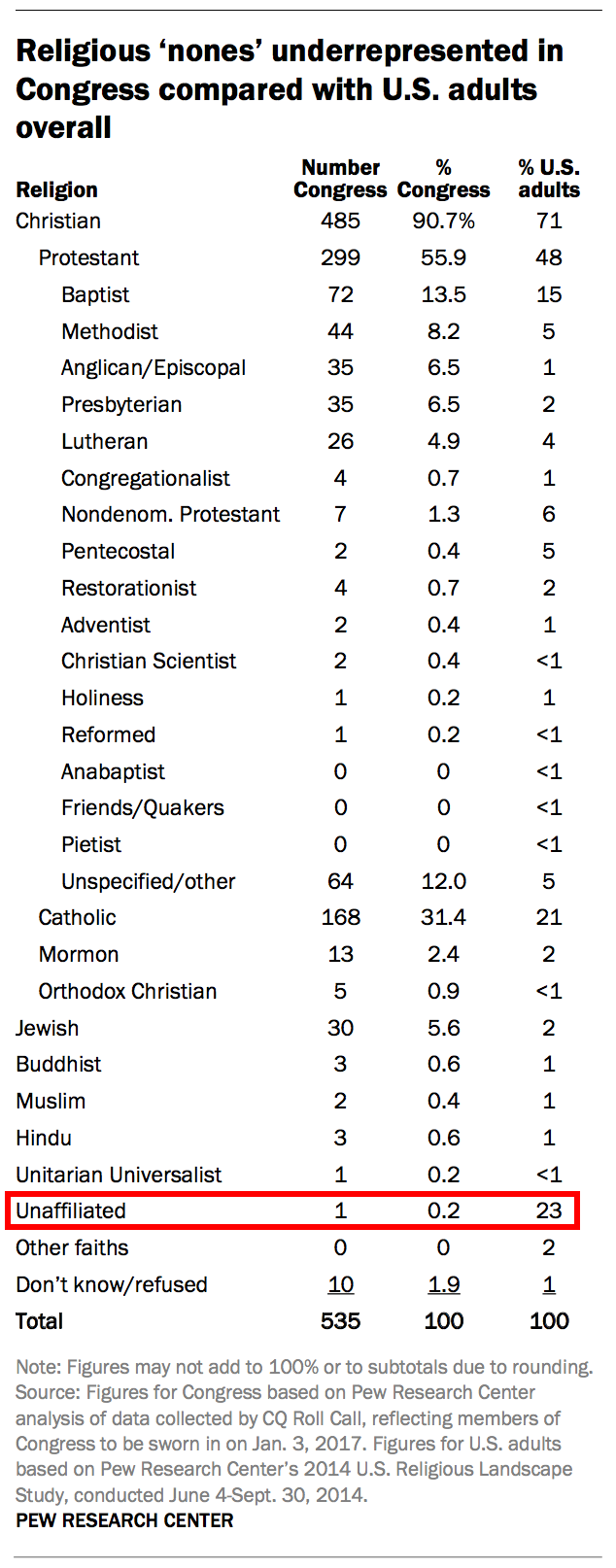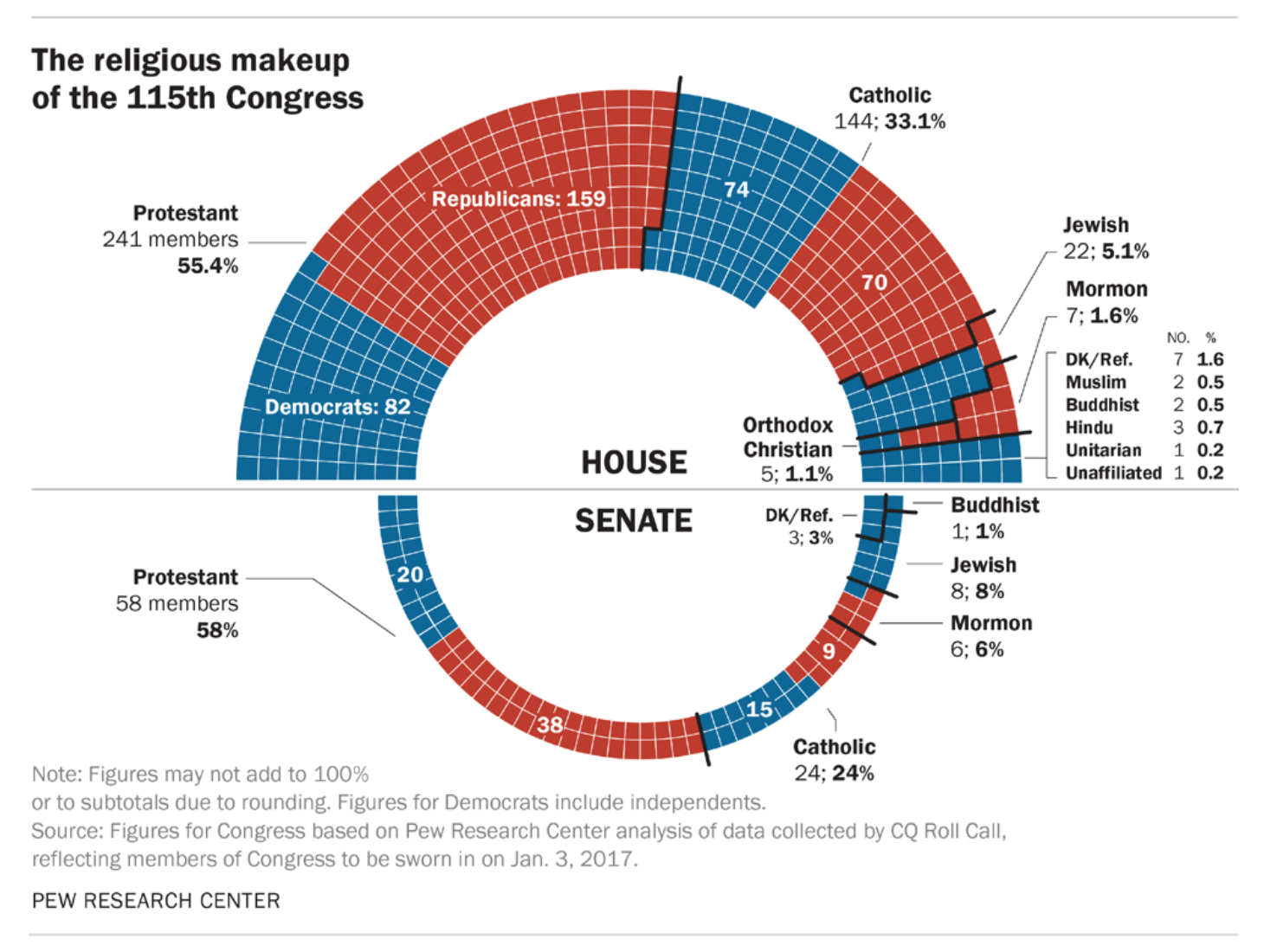I’ve written versions post, in many parts word for word, over the past several years. That’s how little things have changed regarding the religious demographics in Congress when it comes to open atheists.
…
When the new members of Congress take their oaths today, we will once again see a House and Senate completely devoid of open atheists. We haven’t had a legislator openly profess a disbelief in God’s existence since Rep. Pete Stark (D-CA) was voted out of office in 2012 after 40 years — and even he used the label “Unitarian.”
According to the Pew Research Center, which reports on the religious makeup of Congress every two years, here’s what we know about the religious affiliations of the 115th Congress.
It’s pretty similar to the American public: overwhelmingly Christian with a spattering of Jews, Muslims, and followers of other faiths.
Except in one category… The “Unaffiliated.”

We’re almost completely missing this time around, too.
The group that is most notably underrepresented is the religiously unaffiliated. This group — also known as religious “nones” — now accounts for 23% of the general public but just 0.2% of Congress. As noted above, Kyrsten Sinema of Arizona is the only member who describes herself as religiously unaffiliated.
It’s tempting to give Sinema credit for being a None, but when asked if she was an atheist when she was first elected to Congress in 2012, her spokesperson dismissed the label by saying, “Kyrsten believes the terms non-theist, atheist or nonbeliever are not befitting of her life’s work or personal character.” So there’s that.
What about Jamie Raskin, the freshman representative from Maryland? Wasn’t there a big kerfuffle about him not believing in God?
Whatever he believes in private, he’s using the label “Jewish.” That may be a secular form of Judaism, but on paper, there’s no distinction. Former Rep. Barney Frank, after he left office, said that while he didn’t believe in God, he also didn’t like the word “atheist” as a descriptor for himself and never used it, in part, out of fear that the Jewish community would see him as anti-Semitic. Raskin said earlier this year that he was “one hundred percent Jewish,” “emphatically Jewish,” and that “I’ve never called myself an atheist.” (Ironically, none of that means he’s not an atheist.)
So to summarize, we have one alleged atheist who says he’s Jewish, one self-described “Unaffiliated” congresswoman who thinks atheism is beneath her, and a whole bunch of legislators who (I’m damn near certain) are probably in the closet about their non-religiosity.
Republicans, of course, don’t even enter into this conversation.
And even if Sinema is a “None,” having only one openly non-religious member of Congress is simply awful. We need to do better than that and get more open atheists elected. To do that, we need more open atheists to run for public office.

By the way, who are those 10 members of Congress who are “Unspecified” or who didn’t answer the question?
Rep. Jared Huffman (D-CA)
Rep. Judy Chu (D-CA)
Rep. Bill Foster (D-IL)
Rep. Suzanne Bonamici (D-OR)
Rep. Earl Blumenauer (D-OR)
Rep. Pramila Jayapal (D-WA)
Rep. Mark Pocan (D-WI)
Sen. Michael Bennet (D-CO)
Sen. Tammy Duckworth (D-IL)
Sen. Tammy Baldwin (D-WI)
Jayapal is a new addition to that list since two years ago, while Baldwin is now a Senator instead of a House member.
By the way, I have to point out, since commenters will inevitably say it, that this is ultimately a superficial way of viewing the legislators. Everything I’m writing here is about symbolism — and there is a lot of importance in the idea of having an open atheist in public office. That would go a long way in decreasing the anti-atheist stigma that exists in our society.
At the same time, what really matters is how those legislators would vote on issues that matter to us. A Republican atheist who voted against women’s rights, LGBT rights, and church/state separation would be fighting the wishes of most people who identify as atheists. It wouldn’t be something to celebrate. And there are so many religious Democrats who do a wonderful job fighting for progressive causes. As long as they keep doing that, I couldn’t care less how they self-identify.
But still, it would be nice to have members of Congress — or how about just one for starters — willing to admit they don’t buy into faith-based nonsense.



It’s Moving Day for the Friendly ..."
It’s Moving Day for the Friendly ..."
It’s Moving Day for the Friendly ..."
It’s Moving Day for the Friendly ..."